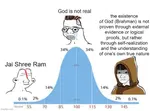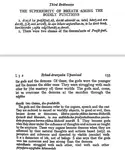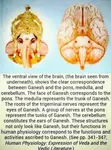Recent Posts
Who is your isht Devi/devta?
Caste is a Western Construct ....
i hate this madarchod ka pilla
Which sect are you most attracted to ?
Does God Exist?
Hindus are doomed
Is Indra considered the Supreme God In vedic hindu...
Why should Jats/Jatts/Zutts be Hindus ?
Varnashrama
What is that "One Book(s)" that everyone should re...
Post Indian normiecore
christianity
watch this jain baba bragging about jains exploiti...
Hinduism
Why do Chintus celebrate Brahmahatya ?
do you have faith in Bhagvad Gita ?
Some artwork I made using AI
To all my Musleem Bhachanners
As a Dalit I envy the feeling of religiosity among...
Ashwamedha Yagya
some betichods who sold the religion for cheap rew...
If a muslimahh ties you rakhi should one assume sh...
help with mujeet spreading propaganda
Discourse on the Upaniṣads
B-bros
Yaar Pajeet
coping seething dilating
was Vritra really a serpent ? In my opinion it was...
systematized Theology anyone ?
Kindness will save the world
somebody explain me this mental illness of worship...
lineage investigation
काकभुशुण्डि
Is Shiva an Indo-European deity?

yNYJtK
No.240
Do you believe in a concept of God?

yNYJtK
No.241
>>240(OP)
Personally I think Atheism is wrong because there is absolutely nothing to support it. All atheists that explicitly reject god rely on an appeal to ignorance, a logical fallacy.
God exists because its a logical conclusion and a necessary being. The universe needs an absolute basis to exist. And an entity where everything depends on it without being dependant.
If the the universe started to "move" by itself, then by nature that first movement is supernatural, because it transcends the laws of the universe.

yNYJtK
No.242
I’ll give you two things to consider.
1. Consciousness
Let’s go back to the Big Bang, it was all just particles and atoms right?
And particles and atoms can’t think. They can’t breathe. They aren’t living.
But somehow, we are alive. We can think. We are conscious.
How? You can’t go from non living to living. Who gave us consciousness? Who gave us life?
2. Expansion of the universe.
The universe is expanding. Think of it like a balloon. If a balloon is inflating, this means that something is inflating it.
And it can’t be infinitely inflating, the fact that it is expanding means that there was a time when it was less than it was now. This means that there was a start.
What started it? Energy? Where did the energy come from?
The universe started itself? Can a balloon inflate itself?
The universe was created by nothing? Really?

yNYJtK
No.243
The single best argument i have ever come up with myself against atheism is this
1. We rely on Reason to make sense of everything, from both day to day actions to scientific discoveries such as gravity/evolution/big bang etc etc. Furthermore any argument that an Atheist might present also relies on Reason.
2. But this in turn relies on the assumption that Reason itself is Reasonable. That Reason can actually make sense of Existence.
3. Reason cannot come from that which is unreasonable.
4. But if we assume a completely randomized or meaningless start to the universe, devoid of reason, then there is absolutely no Reason to assume that Reason itself should indeed be Reasonable.
5. And if we can't make that assumption (that Reason is Reasonable), then all of science is invalidated and so is any argument by any Atheist.
6. The only way for any science and any argument by any Atheist (and anything at all actually) to make any sense is if the universe had a reasoned beginning, which requires that a thinking reasonable mind that transcends the universe had an influence in how the universe got started.
7. This Cosmic Mind, the initiator of the reasoned start of the universe, through which all Reasoned conclusions we make are even possible, is what we call in the English language as God/Gods.
8. Thus an Atheist (or anybody else) cannot possibly use any Reason to try and deny God/Gods, because for Reason to all be reasonable, God/Gods is/are a necessity.

yNYJtK
No.244
>Either the universe is the product of a creative intelligence or it is not. There is no middle ground. Let us begin with the assumption that the universe is not the product of an intentional initiator, and consider what follows necessarily from that assumption:
>
>When we presume the universe arises without causative intent then we conclude that the physical principles of said universe have no teleology - there is no sense in which any particular relationships of any kind ought to be. Forces and their fields occur without any necessary function. The whole world becomes a just-so story. It is what it is.
>
>However, of course, such a trivial state of affairs has no consequentiality beyond mere coincidence. All is literally nebulous.
>
>At this point, we may invoke a fudge-factor named ‘emergence’, but as we do so we must appreciate a very particular sleight-of-hand that is involved in doing so:
>
>You see, logic cannot possibly be an emergent property. The reason for this is that reason does not emerge from what is not reasonable. If it does, then there is no difference between ‘science’ and nonsense - they are literally the same stuff. A probabilistic materialism (the position that assumes a causeless universe results produces emergent intelligence because the physical properties of that universe just so happen to give rise to rationally-relative biological mechanics) must not only propose arbitrary evolution of intelligence but also that the relevance of such intelligence to the universe from which it emerges is also arbitrary.
>
>In other words, regardless of what one considers information to be, an unintentional universe does not develop any analytic potential because there cannot possibly be any. All coincidental physical events are non-sequiturs, in logical terms.
>
>In an unintentional universe there is no ‘learning’ because there is no purpose. In no way can nebulae produce notions of necessity. Again, logic does not and cannot emerge independently because such a process renders what is unreasonable as a precursor to what is prescient. Mark my words: such a state of affairs invalidates science.
>
>Again, the reason is this: where reason is initially absent it does not appear sans axioma. Coincidence does not create. More importantly, it does not imply.
>
>Some have said that although theism appears as a logical necessity in this manner, it is merely a placeholder that avoids the ‘existential dread’ of a meaningless and unintelligible world, however this too is an error - because fear is an impossibility in such a scenario. Without anticipation or analysis - without the impetus for such an assessment of the environment there is no way that coincidences could possibly begin to consider any potential circumstances as ‘better’ or ‘worse’. What emerges from an environment for no reason is no different to that environment. As Carl Sagan said - ‘we are star-stuff’. He just didn’t think about what that would mean.
>
>It would mean nothing. Like all ‘knowledge’. Like all ‘logic’. Like all ‘words’.
>
>Yet here you are, reading. As one ancient text says - “Let the reader understand”.

IFUJLp
No.245
>>240(OP)
there are no gods, bhachanner.

9OvR7O
No.356
>>240(OP)
Yes

vHjFzO
No.412
>>240(OP)
No

hHz6Mm
No.414
>>241
Kek so wrong

aEWV6J
No.415
>>241
just because there is no concrete theory to explain something doesn't mean god did it is the logical solution.

hHz6Mm
No.416
>>415
God of the gaps. Everytime science explains something, God withdraws from that domain. These guys can only apply God to phenomena not explained by science yet, or claim that there's a higher force without any evidence. Lightning used to be God's wrath but now we know, and people will keep changing the definition of God to their most convenient one, that can shun all accountability. Whenever something bad happens, it's a test. If it's good, it's a blessing.
Its the longest generational cope humanity has come up with

JImjoZ
No.417
>>416
This tbh cave men would have been like oh look at the stars they are so beautiful and we can't reach them surely God must have made them!
This has now turned into the fine tuning and before the big bang argument, when asked for proof that it was sone creator who did this they will say that the phenomenon is enough proof not realising that it really isn't. Then they have the gall to say that science has proven god.

J3S6Mc
No.419
the big bang theory has been out for over a century, despite humanity seeing an unprecedented rise in technology we are yet to move past that, at present god or a higher form is a logical explanation for life before big bang

S1tw/3
No.420
Only satiable explaination I came to believe is:
Universe is timeless and eternal. It has existed since eternity and will continue to do so until infinity. It cannot be created nor destroyed. It undergoes changes in cycles of ups and downs within very long stretch of times and thereby making us believe that there are starts and ends when there aren't any.
God exists not as a creator but only as a better human. Time and again such gods (simply better humans) emerge to show path to the world.
Interestingly, it has a lot of parallels with Jain philosophy

UyJtOB
No.421
>>240(OP)
There is an evil god who only believes in tormenting me.

UyJtOB
No.422
>>421
This is supported by the science btw

3jJtID
No.598
>>242
Why can't the universe be eternal? I don't like cosmological arguments and I feel that they have been essentially dead since Taggart and Kant.

3jJtID
No.599
>>243
This is the TAG (Transcendental argument for God) it is up there with presuppositionalism as the best argument for idealism/god. Impressive that you were able to come up with this on your own.

Sy+eRI
No.652
Define what you mean by God OP




















































